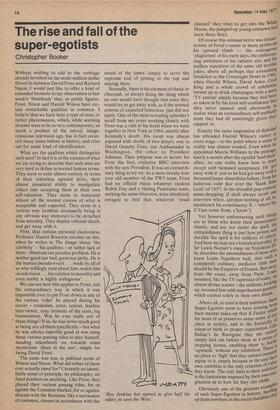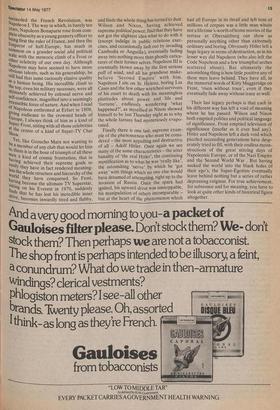The rise and fall of the Super-egotists
Christopher Booker
Without wishing to add to the verbiage already lavished on the multi-million-dollar Drool-In between David Frost and Richard Nixon, I would just like to offer a kind of extended footnote to my observation in last week's 'Notebook' that, as public figures, Frost, Nixon and Harold Wilson have certain remarkable qualities in common. I believe that we have here a type of man, or rather phenomenon, which, while seeming in some ways to be so very contemporary, so much a product of the unreal, imageconscious television age, has in fact occurred many times before in history, and cries out for some kind of identification.
What are the qualities which distinguish such men? In fact it is of the essence of what we are trying to describe that such men are very hard to define in normal human terms. They seem to exist almost entirely in terms of their relentless upward drive, their almost unnatural ability to manipulate others into accepting them at their own self-valuation. They seem to transcend almost all the normal canons of what is acceptable and expected. They seem in a curious way (without necessarily being in any obvious way immoral) to be detached from morality. They display colossal cheek, and get away with it.
First, that curious personal elusiveness. Professor Daniel Boorstin touches on this, when he writes in The Image about 'the celebrity' 'his qualities or rather lack of them -illustrate our peculiar problem. He is neither good nor bad, great nor petty. He is the human pseudo'-event . . . made by all of us who willingly read about him, watch him on television . . . his relation to morality and even reality is highly ambiguous'.
We can see how this applies to Frost, and the extraordinary way in which it was impossible ever to pin Frost down to any of the various 'roles' he played during his career comedian, actor, satirist, fearless interviewer, cosy intimate of the stars, big businessman. Was he ever really any of these things? If so, he was never much good at being any of them specifically but what he was always superbly good at was using these various passing roles to play himself, heading relentlessly on towards some mysterious 'place in the sun', simply for being David Frost.
The same was true in political terms of Wilson and Nixon. What did either Of them ever actually stand for? Certainly no identifiable point of principle, no philosophy, no fixed position on anything. Like Frost, they played their various passing roles, for or against the Common Market, for or against détente with the Russians, like a succession of costumes, chosen in accordance with the
mood of the times, simply to serve the supreme end of getting to the top and staying there.
Secondly, there is the element of cheek or chutzpah, of always doing the thing which no one would have thought that even they would try to get away with, as if the normal criteria of expected behaviour just did not apply. One of the most revealing episodes I recall from my years working closely with Frost was a visit to his hotel when we were together in New York in 1964, shortly after Kennedy's death. His room was almost papered With drafts of two letters, one to David Ormsby Gore, our Ambassador in Washington, the other to President Johnson. Their purpose was to secure for Frost The first, exclusive BBC interview with the new President. It was an extraordinary thing to try on. As a mere twenty-four year old member of the TW3 team, Frost had no official status whatever (indeed Robin Day and a visiting Panorama team, seeking the same interview, were absolutely enraged to find that, whatever 'usual
channel' they tried to get into the White, House, the jumped-up young unknown ha° been there first).
Of course this colossal nerve was characteristic of Frost's career at many points On his upward climb — the outrageous 'plagiarism' of his early days, the embarrassing awfulness of his cabaret acts and his endless repetition of the same old terrible jokes, above all perhaps that astonishing breakfast at the Connaught Hotel in 1966, when Harold Wilson, David Astor, Cecil King and a whole crowd of celebrities turned up to drink champagne with a mere 'TV satirist' simply because they had bee° so taken in by his total self-confidence that they never paused until afterwards t° realise what an extraordinary self-publicitY' stunt they had all unwittingly given their support to. Exactly the same suspension of disbelief has attended Harold Wilson's career at every stage to the -point where a sense of reality was almost eroded. Even when Ile appointed Marcia Williams to the peerage, barely a month after the squalid 'land deals' affair, no one really knew how to react except with bemused acceptance. He `got away with it' just as he had got away wirh,a thousand lesser absurdities before, from his ludicrous volte face over the 'Bank gate Leak' of 1957, to his dreadful pop-cultural name-dropping (I shall always recall 00e interview when, apropos nothing at all, he mentioned his constituency X 'where the Z Cars come from, ylnow'). Yet however embarrassing such things ca lroe s et to y haonsde wa rheo nkont o uwn dt he er i rt hpee rsppeetiri t the extraordinary thing is just how potent a° durable the spell is for millions of others' And here we may see a historical parallel. fin Sir Lewis Namier's essay on Napoleon II' he describes the astonishment of those wil° knew Louis Napoleon well, that such a completely ordinary, mediocre little Ma° should be the Emperor of France. But avin.Ys from the court, away from Paris, LOW., assumed, like the TV superstar of today, a" almost divine stature the millions, lookings up, invested him with superhuman qualitie which existed solely in their own minds'
se
Above all, so total is their ambition, r-eni
Super-Egotists seem to have missing h their mental make-up that X-Factor
for most of us preserves some sense Of °„/ place in society, and in the hierarchY.:e talent or birth or proper expectation. kli'ty Balzac's de Rastignac they see socieof simply laid out before them as a seriesrde stepping stones, enabling them to is 'upwards' without any inhibition. There.,,, no place so 'high' that they cannot instaLle"iir aspire to it, simply because in the end t",„e own ambitiOn is the only criterion of va.1:0 they know. The only limit to their ambinva, is the limitations imposed by their own iW gination as to how far they can climb. les
Obviously one of the greatest examt„,
hurt of such Super-Egotism in history, ath t
up from nowhere in the social sharnbles
succeeded the French Revolution, was NaPoleon I. The way in which, in barely ten Years, Napoleon Bonaparte rose from comPlete obscurity as a young gunnery officer to being first the ruler of France, and then the Iltperor of half-Europe, has much in e°rrimon on a grander social mid political Seale with the meteoric climb of a Frost or other celebrity of our own day. Although Nlarkeleon may have seemed to have more obvious talents, such as his generalship, he still had that same curiously elusive quality as a human being. His incredible climb to the top, even his military successes, were all Ultimately achieved by cdlossal nerve and s, elf-confidence, magnified into a seemingly Irresistible force of nature. And when I read of Napoleon enthroned at Erfurt in 1808, ruing audience to the crowned heads of rope tiPer-Frost, sitting with all those celebrities at the centre of a kind of Super-TV Chat Show.
Yet, like Groucho Marx not wanting to be a member of any club that would let him III, there is in the hour of triumph of all these having kind of cosmic frustration, that in 21".log achieved their supreme goals so ,`asIly they have in fact rendered meaning'ess the whole structure and hierarchy of the having they have conquered. So Frost, having become the ultimate TV Superstar, Sitting on his Everest in 1970, suddenly fj`l°,ds that he has lost his incredible inner r've, becomes inwardly tired and flabby, and finds the whole thing has turned to dust. Wilson and Nixon, having achieved supreme political power, find that they have not got the slightest idea what to do with it (except indulge in public relations exercises, and occasionally lash out by invading Cambodia or Anguilla), eventually fading away into nothing more than ghostly caricatures of their former selves. Napoleon III is eventually blown away by the first serious puff of wind, and all his grandiose makebelieve 'Second Empire' with him. Napoleon I sits on St. Helena, boring Las Cases and the few other wretched survivors of his court to death with his meaningless platitudes about power and life and 'fortune', endlessly wondering 'what happened?', as mystified as Nixon showed himself to be last Thursday night as to why the whole fantasy had mysteriously evaporated.
Finally there is one last, supreme example of the phenomenon who must be considered — the most appalling and destructive of all — Adolf Hitler. Once again we see many of the same characteristics — the utter banality of 'the real Hitler', the continuing mystification as to what he was 'really like', the astonishing 'nerve' by which he 'got away' with things which no one else would have dreamed of attempting, right up to the invasion of Russia. Once the spark had ignited, his upward drive was unstoppable, his manipulation of others incomparable — but at the heart of the phenomenon which
had all Europe in its thrall and left tens of millions of corpses was a little man whom not a lifetime's-worth of home movies of the terrace •at Obersalzburg can show as personally anything other than extremely ordinary and boring. Obviously Hitler left a huge legacy in terms of destruction, as in his lesser way did Napoleon (who also left the Code Napoleon and a few triumphal arches scattered about). But ultimately the astonishing thing is how little positive any of these men leave behind. They have all, in the immortal words of Kitty Muggeridge on Frost, 'risen without trace', even if they eventually fade away without trace as well.
Their last legacy perhaps is that each in his different way has left a void of meaning where he has passed. Wilson and Nixon both emptied politics and political language of significance. Frost emptied television of significance (insofar as it ever had any). Hitler and Napoleon left a dark void which puzzled succeeding generations have desperately tried to fill, with their endless reconstructions of the great stirring days of Napoleonic Europe, or of the Nazi Empire and the Second World War . But having sucked the world into the black holes of their ego's, the Super-Egotists eventually leave behind nothing but a series of rather depressing enigmas. For true achievement, for substance and for meaning, you have to look at quite other kinds of historical figure altogether.



































 Previous page
Previous page